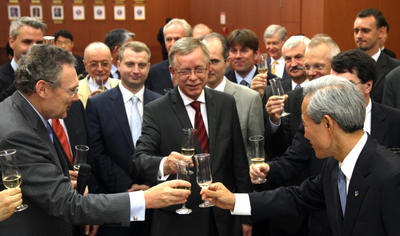But with little evidence to show that these FTAs have had, or will have, anywhere near the transformative effects on the Korean economy as the earlier liberalisation in the 1980s, it is now time to think about the next stage of Korea’s trade policy strategy and economic diplomacy.
The Korea–US FTA (KORUS) came into effect in March 2012, giving Korea politically significant FTAs with the United States, European Union (KOREU), India and ASEAN. Among the countries with which Korea currently has FTAs under negotiation or in the consideration stage are Australia, Canada, Mexico, Japan, China and Indonesia. If those were all completed, Korea will have trade agreements with its largest trading partners and political allies.
The other major trade agreement in the region that could involve Korea is the Trans-Pacific Partnership (TPP) being negotiated by eleven countries in the Asia Pacific, led by the United States. In one sense, given Korea already has deals with all but Brunei of those members, joining TPP would be relatively easy. But given the political difficulties it had in passing KORUS through its legislature, it has appeared unlikely that Korea will join TPP talks in the near future. That situation could change rapidly after the Korean elections.
KOREU and KORUS are playing an important role in liberalising Korea’s heavily protected automotive, services and agricultural sectors — albeit with exclusions and long phase-out periods of protection — which is arguably more difficult to achieve multilaterally.
The bicycle theory of trade suggests that a country should continue to liberalise otherwise they will backtrack into protectionism or liberalisation will become stalled. Korea is pedalling very fast but is it toward a dead end with too strong a focus on FTAs? Negotiating trade deals consumes a lot of resources and bureaucratic energy but is it worth it to sign more deals with smaller countries? Would pedalling in a different gear or different direction move Korea forward more effectively?
Korea can be an active agent, or better, a leader in untangling the extensive network of FTAs and supporting the multilateral trading system. That would benefit Korea, its trading partners and regional trade flows, and contribute to buttressing the global trading system. It would hurt narrow interests that currently have preferential access to Korean markets, but those preferences are at the expense of Korean consumers and third-party country trading partners. It is in Korea’s interest to extend the opening up of its market which has been achieved via FTAs, to all countries. Leading a concerted approach to untangling FTAs could compound the benefits.
With Korea having opened up to US and European automobile companies, it should be relatively easy to eliminate tariffs toward Japanese and other auto suppliers so that the Korean automobile market is more open, competitive and able to improve Korean consumer welfare. There is no justification for making any potential innovative or cheaper cars from Japan, China or elsewhere relatively more expensive in favour of US or European cars.
The same applies for other sectors. There is no reason to limit foreign legal and financial service delivery to a few preferentially favoured sources. In agriculture, Australia and Korea do not need an FTA for Korea to extend the tariff reductions already in place for United States and Europe to Australian beef and other goods. Access to cheap agricultural goods should be extended to other agricultural producers so that Korean consumers can benefit from more product varieties, cheaper goods and more liberal trade with producers in the Southern Hemisphere with different climates.
Korea needs a new trade liberalisation paradigm and strategy that takes it beyond FTAs so it moves from opening up certain sensitive sectors to global powers bilaterally, to opening up for a more efficient, open and contestable market, which will in turn strengthen Korea’s economy. The aim for Korea is to have well-regulated and competitive markets, not markets with barriers to entry and national treatment for preferred-country firms. As one of Asia’s most developed economies, Korea should focus on adopting regulatory best practice and using its membership of the OECD, for example, to co-opt the most advanced benchmarks for new regulatory challenges.
The debate needs move on, toward making Korea more competitive internationally and continuing its successful development. That will take it away from picking preferred trading partners and leading the world in riding the FTA bicycle, towards becoming a top tier industrial country open to trade and investment with any economy on equal terms.
Shiro Armstrong is a Research Fellow at the Crawford School of Public Policy and Editor of the East Asia Forum.
This piece is a shorter version of a piece which appeared in the Korean Economy 2012 by the Korean Economic Institute.

